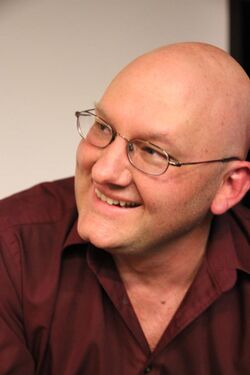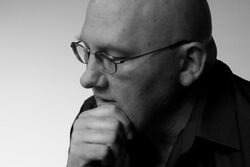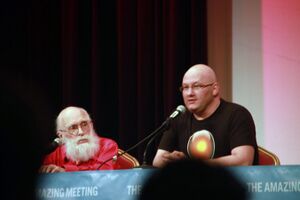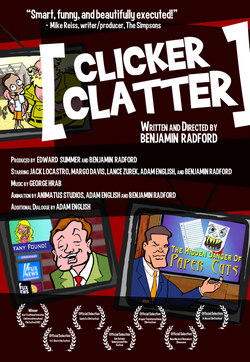Biography:Benjamin Radford
Benjamin Radford | |
|---|---|
 Ben Radford lectures at CFI West on Paranormal Investigations, June 18, 2011 | |
| Born | October 2, 1970 New York City, U.S. |
| Education | Master's in Public Health Master's in Education Bachelor's in Psychology |
| Alma mater | Dartmouth College University at Buffalo University of New Mexico |
| Occupation | Writer, investigator, podcaster, research fellow |
| Known for | Media and science literacy educator, scientific paranormal investigation, MonsterTalk podcast, Squaring the Strange podcast |
| Website | benjaminradford |
| Signature | |
 | |
Benjamin Radford (born October 2, 1970) is an American writer, investigator, and skeptic. He has authored, coauthored or contributed to over twenty books and written over a thousand articles and columns on a wide variety of topics including urban legends, unexplained mysteries, the paranormal, critical thinking, mass hysteria, and media literacy. His book, Mysterious New Mexico: Miracles, Magic, and Monsters in the Land of Enchantment, was published in the summer of 2014 and is a scientific investigation of famous legends and folklore in the state of New Mexico. In 2016 Radford published Bad Clowns, a 2017 IPPY bronze award winner,[1] and he is regarded as an expert on the bad clowns phenomenon.[2]
Radford has appeared on Good Morning America, CNN, The History Channel, the National Geographic Channel, the Learning Channel, CBC, BBC, ABC News, The New York Times , and many other outlets.
Radford characterizes himself as one of the world's few science-based paranormal investigators, and has done first-hand research into psychics, ghosts,[3] exorcisms, miracles, Bigfoot, stigmata, lake monsters, UFO sightings, reincarnation, crop circles, and other topics. "I'm open-minded. I never said I don't believe ghosts exist. But I can say I've looked at the research that's been done, and I've done personal investigations. In each particular case there either is or isn't good, compelling evidence, and so far I haven't seen it."[4]
He regularly speaks at universities and conferences across the country about his research, and about science and skepticism.[5] Radford's books and investigations have been incorporated into several college and university courses on critical thinking, including at Western Washington University and the University of New Mexico.[6]
Radford is also a contributor to the website Snopes.com, where he has researched and written articles debunking fakelore and a variety of popular myths including The Amityville Horror,[7] and the claim that humans only use 10% of their brains.[8]
Early life
Radford became interested in "the mysterious and the unexplained" as a child from reading books about, "monsters and dragons, the Bermuda Triangle, psychics in Russia that could move automobiles with their mind", etc. He also became interested through television shows such as That's Incredible and Ripley's Believe It or Not. He grew disenchanted with the lack of scientific rigor in the books and television shows because there seemed to be little or no investigation or proper references.[9]
Radford's first encounter with formal skepticism came as a result of a fruitless search for beer in a "dry" county in Utah. Winning a regional essay contest while at the University of New Mexico, he was flown to present his paper at a college town in Utah. He and his colleagues came across a tiny used bookstore where he acquired an old issue of Skeptical Inquirer featuring an article on the prophesies of Nostradamus penned by none other than James Randi. He relates that this was the first article he'd read criticizing Nostradamus and offered "skeptical, logical, and reasonable explanations for the prophecies apparent accuracy".[10]
Radford holds a bachelor's degree in psychology (graduating magna cum laude) with a minor in professional writing from the University of New Mexico where he was inducted into the Phi Beta Kappa honor society in 1993. He also has a master's degree in education from the University at Buffalo where his focus was on Science and the Public, and his masters thesis was titled Misinformation in Eating Disorder Communications: Implications for Science Communication Policy.[11] Radford stated that he chose this topic because it "involved several of my longstanding interests such as myths and misinformation ... eating disorders (a subject I first became involved with when helping an ex-girlfriend struggle with bulimia); and the news media".[12]
He graduated from the Geisel School of Medicine at Dartmouth in 2022, earning a master's degree in Public Health. He was inducted into the Delta Omega Honorary Society in Public Health, and was the recipient of a 2022 Social Justice Award from the Dartmouth Institute.[13]
Career
Journalism
Radford served as managing editor of the science magazine Skeptical Inquirer from 1997 until early 2011, when he was promoted to deputy editor. He is also a regular columnist at the magazine.[14] Until it suspended publication in 2009, he was editor-in-chief of the Spanish-language magazine Pensar, published in Buenos Aires, Argentina.[15] Radford is also a regular columnist for Discovery News, LiveScience.com, and the Skeptical Briefs newsletter.[citation needed]
Radford is a co-founder and former co-host of MonsterTalk, a podcast, which critically examines the science and folklore behind cryptozoological (and legendary) creatures such as Bigfoot, the Loch Ness Monster and werewolves.[16] MonsterTalk won the 2012 Parsec podcast award for the “Best Fact Behind the Fiction” category.[17]
Radford is a Research Fellow with the non-profit educational organization Committee for Skeptical Inquiry,[18] and presented at the American Folklore Society's 2011 annual conference on Folklore of the Chupacabra.[19]
Radford's writings also focus on topics related to women and minorities, particularly in South America and Africa. Through his books, articles, blogs, and podcasts he has raised awareness of many social problems that disproportionately affect women, including modern witchcraft in India, Nepal, and Pakistan;[20] the Chibok schoolgirls kidnapping in 2014;[21] acid attack victims in Pakistan ;[22] and sex trafficking.[23]
Guy P. Harrison reviews Radford's 2016 book Bad Clowns saying, "Who knew naughty clowns could be so interesting?" Radford spends time on the "unfounded hype and hysteria" of stories of clowns in journalism including John Wayne Gacy and the Aurora Colorado shooter James Holmes.[24]
Scientific paranormal investigator
Described as a "professional skeptic", Radford works at the Committee for Skeptical Inquiry investigating all manner of unusual claims and events. His work includes investigation, reporting, journalism, science literacy education, and public speaking.[25]
Radford explains his approach by saying "I am not paid to doubt things; I am paid to promote science and investigate unusual claims. Our approach is empirical, evidence- and science-based. Science has proven itself incredibly successful in explaining and finding out about the world. If we wish to know why a certain disease strikes one person and not another, we turn to medicine instead of a witch doctor. If we wish to know how to build a bridge that can span a river, we turn to physics instead of psychics. Paranormal or “unexplained” topics are testable by science: either a psychic's prediction comes true or it doesn't; either ghosts exist in the real world or they don't. My job is not to doubt, nor debunk; it is to investigate. I have no vested interest in proving or disproving any unexplained phenomena; I get paid the same either way. But the cardinal rule is that an investigator must eliminate all the natural explanations before accepting supernatural ones, and must use sound science."[10]
When asked "Have you ever been stumped by a mysterious claim?" Radford responded, "No". He responded more fully that there are times with some claims there isn't enough information or the information given to him wasn't correct. Radford compares these investigations to a crime scene investigating where there exists "a positive correlation between the quality of the available evidence and solving the mystery". Radford states he has a "high bar for what I am willing to concede is 'unexplained' or truly mysterious".[26]
Paranormal researcher Brian D. Parsons in a review for Investigating Ghosts, praised the book, stating, "Radford is not saying ghosts do not exist. He's merely explaining and demonstrating that ghost researchers have been going about things wrong for a very long time".[27]
Awards
As of 2023 Radford has been a finalist or winner of eight book awards.
| Year | Award | From | Title |
|---|---|---|---|
| 2011 | Finalist | New Mexico-Arizona Book Awards | Tracking the Chupacabra: The Vampire Beast in Fact, Fiction, and Folklore[28] |
| 2011 | Finalist | Foreword Reviews Book of the Year award | Tracking the Chupacabra: The Vampire Beast in Fact, Fiction, and Folklore[29] |
| 2012 | Finalist | New Mexico-Arizona Book Awards | Scientific Paranormal Investigation: How to Solve Unexplained Mysteries[30] |
| 2014 | Winner | Southwest Book Award | Mysterious New Mexico: Miracles, Magic, and Monsters in the Land of Enchantment[31] |
| 2017 | Bronze | Independent Publisher Book Awards | Bad Clowns [32] |
| 2018 | Winner, Science Category | New Mexico-Arizona Book Awards | Investigating Ghosts: The Scientific Search for Spirits[33] |
| 2021 | Finalist, Nonfiction General | New Mexico-Arizona Book Awards | Big-If True: Adventures in Oddity[34] |
| 2023 | Winner, Politics/Current Events | New Mexico-Arizona Book Awards | America the Fearful: Media and the Marketing of National Panic[35] |
Squaring the Strange
In April 2017 Radford and Pascual Romero launched the Squaring the Strange podcast with evidence-based analysis and commentary on a variety of topics ranging from the paranormal to the political.[36] Frequent contributor and content producer Celestia Ward was later added as a cohost.[37][38] The podcast features discussions on a wide variety of subjects including psychology, myths, hoaxes, folklore, and science.[39] It has featured Radford's detailed analysis of the Blue Whale Challenge scare and his passionate criticism of the History Channel's Amelia Earhart documentary and its discredited photographic evidence.[40]
Investigations
Radford has conducted numerous investigations into "unexplained" phenomena. These are some of his best-known cases:
Pokémon panic (1997)
In 2001, Radford investigated the mysterious 1997 incident in which thousands of Japanese children seemingly suffered seizures while watching "Dennō Senshi Porygon", an episode of the Pokémon anime. Though many doctors advanced theories including photosensitive epilepsy, Radford proffered evidence that the incident was rooted in mass hysteria. The resulting article, co-authored by Robert Bartholomew, was published in the February 2001 Southern Medical Journal.[41]
"We studied a reported illness outbreak occurring on December 16, 1997, involving more than 12,000 Japanese children who had various signs and symptoms of illness after watching an episode of a popular animated cartoon, Pokémon. While photosensitive epilepsy was diagnosed in a minuscule fraction of those affected, this explanation cannot account for the breadth and pattern of the events. The characteristic features of the episode are consistent with the diagnosis of epidemic hysteria, triggered by sudden anxiety after dramatic mass media reports describing a relatively small number of genuine photosensitive-epilepsy seizures. The importance of the mass media in precipitating outbreaks of mass psychogenic illness is discussed."[41]
Santa Fe courthouse ghost (2007)
In 2007, Radford solved the mystery of the "Santa Fe Courthouse Ghost", a mysterious, glowing, white blob that was captured on videotape June 15, by a security camera at a courthouse in Santa Fe, New Mexico.[42][43] While the court personnel who first saw the image could not explain it, others soon offered their own explanations, and a ghost was among the most popular. Radford conducted several days of on-site field investigations at the courthouse, and after several experiments duplicated the "ghost" effect by placing insects on the video camera that recorded the original event.[42][43]
The Los Angeles UFO / mystery missile (2010)
In November 2010, a UFO was sighted and recorded in the sky over Los Angeles by a news helicopter cameraman.[44]
In a column for Discovery News, Radford was one of the first journalists to critically analyze the video and correctly identify the UFO or “mystery missile” as an airplane contrail.[45]
The White Witch of Rose Hall (2007)
In Fortean Times magazine and his book Scientific Paranormal Investigation, Radford published his re-creations of the "ghost photos" taken at Rose Hall, a mansion near Montego Bay in Jamaica, showing that alleged paranormal phenomena caught on film at that location were camera artifacts and reflected flashes, not ghosts.[46][47]
Kansas City gym ghost video (2008)
Radford investigated and solved the mystery of an alleged "ghost video" taken at Anytime Fitness, an all-night fitness club in Overland Park, Kansas in 2008. Surveillance cameras caught the glowing, fuzzy light in a workout area, wandering over the weight benches and fitness machines. The video was circulated on YouTube, generating more than 100,000 views.[48]
Radford concluded the actual culprit to be merely an insect on the camera lens. His conclusions were based on the several facts: 1) the image only showed up on one of several cameras covering the area, 2) the fuzzy and out-of-focus image indicated that the object was closer rather than farther to the security camera which is designed to focus at longer distances, 3) the image appears to reflecting rather than emitting light, and 4) the image appeared to go over objects in the room rather than going around them.[49][50]
The "Champ" photo (1977)
The photo, taken by Sandra Mansi in 1977, sparked investigations and national interest into the creature allegedly living in Lake Champlain. John Kirk, in his book In the Domain of the Lake Monsters, writes that "The monster of Lake Champlain... has the distinction of being the only lake monster of whom there is a reasonably clear photograph. It... is extremely good evidence of an unidentified lake-dwelling animal". After investigating claims of a monster in Lake Champlain that has been nicknamed "Champ", Radford, along with Joe Nickell concluded that the object in the famous photo was almost certainly a floating log or tree-trunk.[51] Joe Zarzynski, author of Champ: Beyond the Legend (1984), calls the photo "the best single piece of evidence on Champ."
The results of the Champ and Mansi photo investigation were published in the book Lake Monster Mysteries, as well as in Skeptical Inquirer magazine and Fortean Times magazine. Radford and Nickell re-enacted their experiments and investigation for the Discovery Channel in 1995.[52][53]
Chupacabra (2010)
Radford spent five years investigating the mysterious monster el chupacabra, and came to the conclusion that the monster sightings were inspired by the 1995 film Species, and were aided and abetted by faulty eyewitness accounts, lack of forensic knowledge, and mass hysteria. His account of the investigation is detailed in his 2011 book Tracking the Chupacabra: The Vampire Beast in Fact, Fiction, and Folklore. The investigation included eyewitness interviews, forensic and folkloric research, and "a field expedition to the jungles of Nicaragua" in search of the legendary monster.[54][55]
Similar media-inspired monster sightings have been offered to explain for Loch Ness Monster (inspired by scenes depicting a Plesiosaur-like monster in the 1933 King Kong movie)[56] and of the fictional bogey-man Slender Man reported on the talk-radio show Coast to Coast.[57]
Tracking the Chupacabra was a Finalist for two books awards including Book of the Year.[58] According to Outside Magazine, Radford came to the conclusion that the chupacabra "was nothing but a cinematic fever dream."[59]
Dyatlov Pass Deaths (2014)
The 2014 Discovery Channel special Russian Yeti: The Killer Lives explored claims that the Dyatlov group was killed by an enraged Russian yeti. Radford wrote an in-depth review of the show for the Doubtful News website on June 1. He noted that "Russian Yeti: The Killer Lives begins with the premise that the injuries sustained by the skiers were so grave and extraordinary that could only have been inflicted by an inhumanly strong creature." Radford pointed out that the evidence believers in the idea point to is present in many other types of pseudoscientific claims, such as the chupacabra and cattle mutilations, and can be accounted for by the predation of convention animals, or in the case of the Dyatlov group, by avalanche.[60][61] Radford points out that producers of the program, and host Mike Libecki, despite encountering such a creature, never mentioned anything else about that being, and never mentioned it in their journals.[60]
Films
Radford has appeared in films that address his investigatory work. In Wrinkles the Clown he discussed the historical roots of deviant clowns,[62] and in Science Friction he was interviewed about his experience with documentaries which misrepresent the interviews with experts in their field.[63]
In addition to his scientific skepticism work, Radford has written and directed several animated short films. In Sirens (2009), "A young boy in a small-town library avoids his math homework and is instead drawn into the world of the mythological Sirens, beautiful women who lured sailors to their doom."[64]
Both films screened at film festivals around the world, and Clicker Clatter won the “Best Traditional Animation” award at the 2007 California International Animation Festival. Clicker Clatter has an online distributor and can be seen at SnagFilms.com.[65]
Board games
Playing Gods
In 2008 Radford released Playing Gods: The Board Game of Divine Domination, a satirical board game he created based on theme of gods warring over the control of believers. The game is described as a "theological version of Risk" and contains figures based on Jesus, Moses, Buddha and many other religions including satirical religions like the Flying Spaghetti Monster and J. R. Bob Dobbs. The game made its world premiere at the New York Toy Fair in March 2009 and debuted at Dragon*Con in Atlanta, Georgia.[66] Playing Gods is produced through Radford's company, Balls Out Entertainment.[66][67]
Australia's Synergy Magazine reported Playing Gods has "some of the nicest pawns I have ever seen in a board game... has great game play and comes with a smart, cynical and satirical tone. Playing Gods is blasphemy with style and offers a great board game with a good dose of insight and a great load of fun!”.[68] Other players have praised the game as "one of the coolest and most important things to happen to parlor games",[69] and "awesome, and damned funny.. it's Candyland for people who want the express train to hell".[70] Carl Raschke, professor of religious studies at University of Denver, criticized Radford's board game telling USA Today that the game "sounds too stupid to go far".[71]
Undead Apocalypse
In 2013, Radford released plans for a followup to the Playing Gods board game, entitled Undead Apocalypse: War of the Damned.[72][73] It would have integrated genuine lore concerning werewolves, vampires and zombies into the board game.[74] A Kickstarter campaign to fund the game was launched in June 2013, but was cancelled when it became clear it would not fully fund.[75]
Selected bibliography
- Bartholomew, Robert; Radford, Benjamin (2003), Hoaxes, Myths, and Manias: Why We Need Critical Thinking, Amherst, NY: Prometheus Books, pp. 229, ISBN 978-1591020486, http://benjaminradford.com/books-by-ben-radford/hoaxes-myths-and-manias/
- Radford, Benjamin (2003), Media Mythmakers : How Journalists, Activists, and Advertisers Mislead Us, Amherst, NY: Prometheus Books, pp. 324, ISBN 978-1591020721, http://benjaminradford.com/books-by-ben-radford/media-mythmakers/
- Radford, Benjamin; Nickell, Joe (2006), Lake Monster Mysteries : Investigating the World's Most Elusive Creatures, Lexington, KY: University Press of Kentucky, pp. 208, ISBN 978-0813123943, http://benjaminradford.com/books-by-ben-radford/lake-monster-mysteries/
- Radford, Benjamin (2010), Scientific Paranormal Investigation: How to Solve Unexplained Mysteries, Rhombus Publishing Company, pp. 312, ISBN 978-0936455112, http://benjaminradford.com/books-by-ben-radford/scientific-paranormal-investigation/
- Radford, Benjamin (2011), Tracking the Chupacabra: The Vampire Beast in Fact, Fiction, and Folklore, University of New Mexico Press, pp. 288, ISBN 978-0826350152, http://benjaminradford.com/books-by-ben-radford/buy-tracking-the-chupacabra/, retrieved March 4, 2014
- Bartholomew, Robert; Radford, Benjamin (2011), The Martians Have Landed! A History of Media-Driven Panics and Hoaxes, McFarland and Co., pp. 254, ISBN 978-0786464982, http://benjaminradford.com/books-by-ben-radford/the-martians-have-landed/
- Radford, Benjamin (2014), Mysterious New Mexico: Miracles, Magic, and Monsters in the Land of Enchantment, University of New Mexico Press, pp. 304, ISBN 978-0826354501
- Radford, Benjamin (2016), Bad Clowns, University of New Mexico Press, pp. 188, ISBN 978-0-8263-5666-6, http://smile.amazon.com/Bad-Clowns-Benjamin-Radford-ebook/dp/B01BJ90AHS/ref=dp_kinw_strp_1
- Radford, Benjamin (2017), Investigating Ghosts: The Scientific Search for Spirits, Rhombus Publishing Company, pp. 396 (Kindle edition), https://www.amazon.com/INVESTIGATING-GHOSTS-Scientific-Search-Spirits-ebook/dp/B0788YCFHP/ref=sr_1_3?ie=UTF8&qid=1513998767&sr=8-3&keywords=investigating%20ghost
- Radford, Benjamin (2020), Big-If True: Adventures in Oddity (Paranormal), Rhombus Publishing Company, pp. 280, ISBN 978-0936455174, https://benjaminradford.com/big-if-true
- Radford, Benjamin (2022), America the Fearful: Media and the Marketing of National Panics, Mcfarland & Company, Inc., pp. 225, ISBN 978-1-4766-8772-8, https://benjaminradford.com/america-the-fearful/
References
- ↑ "2017 Independent Publisher Book Awards National Medalists". Independent Publisher. http://independentpublisher.com/article.php?page=2172&urltitle=2017%20Independent%20Publisher%20Book%20Awards%20National%20Medalists.
- ↑ Shone, Colton. "Recent scary clown trend nothing new, expert said". http://www.kob.com/albuquerque-news/recent-scary-clown-trend-nothing-new-expert-benjamin-radford-bad-clowns-author-book-creepy/4291893/?cat=500.
- ↑ Radford, Benjamin (January 29, 2004), Investigating a Haunted House – Amherst, New York, GhostVillage.com, http://www.ghostvillage.com/resources/2004/resources_01292004.shtml, retrieved March 26, 2009
- ↑ Nott, Robert (October 31, 2014). "Things that go bump in the night". Santa Fe New Mexican. http://www.santafenewmexican.com/pasatiempo/books/new-mexico-s-portal-to-the-otherworldly-skeptic-benjamin-radford/article_1950396e-3ab5-5a2c-9637-3eeb1d3d5975.html.
- ↑ Gerbic, Susan (February 3, 2017). "Local Skeptical Outreach & Activism: Monterey County Skepticamp". https://www.csicop.org/specialarticles/show/mcs_skepticamp.
- ↑ Radford, Benjamin (2010). Scientific Paranormal Investigation. Rhombus Publishing. p. 192.
- ↑ Radford, Benjamin (April 15, 2005), The Amityville Horror, Snopes.com, http://www.snopes.com/horrors/ghosts/amityville.asp, retrieved February 16, 2014
- ↑ Radford, Benjamin (July 21, 2007), The Ten Percent Myth, Snopes.com, http://www.snopes.com/science/stats/10percent.asp, retrieved February 16, 2014
- ↑ "Meet the Skeptics!: Meet Ben Radford". http://meettheskeptics.libsyn.com/mts-meet-ben-radford.
- ↑ 10.0 10.1 Radford, Benjamin (2010). Scientific Paranormal Investigation. Rhombus Publishing. pp. 42–51.
- ↑ Radford, Benjamin (2013). "Misinformation in eating disorder communications: Implications for science communication policy". University of Buffalo. https://ubir.buffalo.edu/xmlui/handle/10477/50272.
- ↑ Radford, Ben (2018). "Medical Misinformation in the Media: Is Anorexia on the Rise?". Skeptical Inquirer (Center for Inquiry) 42 (1): 46–49.
- ↑ Dean, Timothy (2022-06-15). "The Dartmouth Institute Celebrates Class of 2022". https://geiselmed.dartmouth.edu/news/2022/the-dartmouth-institute-celebrates-class-of-2022/.
- ↑ "A Glimpse Backward". Skeptical Inquirer (Center for Inquiry) 40 (6). November–December 2016. http://www.csicop.org/si/show/a_glimpse_backwardand_forwardat_skepticisms_big_tent/. Retrieved March 7, 2017.
- ↑ "Pensar - Quiénes Somos". http://www.pensar.org/quienes-somos.html.
- ↑ "Monster Talk". Skeptic Magazine. October 28, 2008. http://www.skeptic.com/eskeptic/09-10-28/.
- ↑ "2012 Parsec Awards Winners & Finalists". Parsec Awards. http://www.parsecawards.com/2012-parsec-awards/2012-parsec-awards-winners-finalists/.
- ↑ "CSI Fellows and Staff - CSI". http://www.csicop.org/about/csi_fellows_and_staff.
- ↑ "American Folklore Society 2011 Annual Meeting". American Folklore Society. p. 22. http://c.ymcdn.com/sites/www.afsnet.org/resource/resmgr/AM11/AM_2011_Program_9_26.pdf.
- ↑ Radford, Benjamin (July 31, 2014). "Indian Woman Beaten to Death for 'Witchcraft'". https://www.livescience.com/47129-nepalese-woman-killed-for-witchcraft.html.
- ↑ Radford, Ben (September 17, 2014). "Bring Back Our Girls? Boko Haram and the Forgotten Captives". https://www.seeker.com/bring-back-our-girls-boko-haram-and-the-forgotten-captives-1769093143.html.
- ↑ Radford, Benjamin (February 28, 2012). "Oscar-Winning Film Highlights Acid Attack Domestic Violence". http://www.centerforinquiry.net/blogs/entry/oscar-winning_film_highlights_acid_attack_domestic_violence.
- ↑ Radford, Ben (February 25, 2015). "'Witchcraft' Used to Fight Sex Trafficking in Africa". https://www.seeker.com/witchcraft-used-to-fight-sex-trafficking-in-africa-1769543334.html.
- ↑ Harrison, Guy P. (2019). "Scrutinizing the 'Bad Clown' Idea". Skeptical Inquirer 43 (2): 63.
- ↑ Mayberry, Carly (January 6, 2017). "National author to keynote Monterey County Skeptics' third annual SkeptiCamp". Monterey Herald. http://www.montereyherald.com/events/20170106/national-author-to-keynote-monterey-county-skeptics-third-annual-skepticamp.
- ↑ Radford, Ben (2018). "Caught Between the Possible and the Paranormal". Skeptical Inquirer (Center for Inquiry) 42 (5): 30–31.
- ↑ Parsons, Brian D. (2019). "A Friendly Guide Showing How Ghost Hunters Go Wrong". Skeptical Inquirer (Center for Inquiry) 43 (4): 62–63.
- ↑ "2011 New Mexico Book Awards". http://nmbookcoop.com/page8/page14/page14.html.
- ↑ "Book awards: Foreword Reviews Indiefab Book of the Year Award Finalist". https://www.librarything.com/bookaward/Foreword+Reviews+Indiefab+Book+of+the+Year+Award+Finalist.
- ↑ "2012 New Mexico-Arizona Book Awards". http://nmbookcoop.com/BookAwards/page/2012-finalists/2012-finalists.html.
- ↑ "Southwest Book Awards". https://www.brla.info/southwest-book-awards.html.
- ↑ "2017 Independent Publisher Book Awards National Medalists". http://www.independentpublisher.com/article.php?page=2172.
- ↑ "New Mexico-Arizona Book Awards 2018 Winners". http://nmbookcoop.com/WinnersList2018.pdf.
- ↑ "2021 New Mexico-Arizona Book Awards Winners & Finalists". https://nmbookcoop.com/BookAwards/page-10/2021Winners.htm.
- ↑ "New Mexico-Arizona Book Awards 2023 Winners". https://nmbookcoop.com/2023Winners.pdf.
- ↑ "Squaring the Strange". Squaring the Strange. http://squaringthestrange.libsyn.com/website.
- ↑ Gerbic, Susan (May 21, 2018). "GSoW in the Land of Enchantment". Center for Inquiry. https://www.csicop.org/specialarticles/show/gsow_in_the_land_of_enchantment.
- ↑ Palmer, Rob. "Squaring the Skeptic with Celestia Ward (Part 1)". Center for Inquiry. https://skepticalinquirer.org/exclusive/squaring_the_skeptic_with_celestia_ward_part_1/?/specialarticles/show/squaring_the_skeptic_with_celestia_ward_part_1.
- ↑ Radford, Benjamin (April 27, 2017). "My New Podcast: Squaring the Strange!". http://benjaminradford.com/2017/04/27/new-podcast-squaring-strange/.
- ↑ Palmer, Rob. "Squaring the Skeptic with Celestia Ward (Part 2)". Center for Inquiry. https://skepticalinquirer.org/exclusive/squaring_the_skeptic_with_celestia_ward_part_2/?/specialarticles/show/squaring_the_skeptic_with_celestia_ward_part_2.
- ↑ 41.0 41.1 Radford, Benjamin; Bartholomew, Robert PhD (February 2001), "Pokémon Contagion: Photosensitive Epilepsy or Mass Psychogenic Illness?", Southern Medical Journal 94 (2): 197–204, doi:10.1097/00007611-200194020-00005, ISSN 0038-4348, OCLC 1766196, PMID 11235034, https://sma.org/southern-medical-journal/article/pokmon-contagion-photosensitive-epilepsy-or-mass-psychogenic-illness/, retrieved April 25, 2019
- ↑ 42.0 42.1 Radford, Benjamin (Sep–Oct 2007), "Santa Fe 'Courthouse Ghost' Mystery Solved", Skeptical Inquirer (Center for Inquiry) 31 (5), ISSN 0194-6730, http://www.csicop.org/si/show/santa_fe_courthouse_ghost_mystery_solved/, retrieved October 23, 2010
- ↑ 43.0 43.1 Radford, Benjamin (June 21, 2007), "EXCLUSIVE: Courthouse 'Ghost' Video Mystery Solved", LiveScience, http://www.livescience.com/strangenews/070621_santafe_ghost.html, retrieved March 26, 2009
- ↑ "Mystery Rocket Launched Off Californian Coast [Update"]. news.discovery.com. November 9, 2010. http://news.discovery.com/space/mystery-rocket-launched-off-californian-coast.htm.
- ↑ "Examining Official Explanation of the Mystery 'Missile'". Discovery News. http://news.discovery.com/space/examining-official-explanation-of-the-mystery-missile.html.
- ↑ Radford, Benjamin (September 2008), "The White Witch of Rose Hall", Fortean Times (239), ISSN 0308-5899
- ↑ Jill Stefko, "The White Witch of Rose Hall", Suite101.com (site blocked)
- ↑ "Is Light Caught On Camera A Ghost?". YouTube. September 24, 2008. https://www.youtube.com/watch?v=eLkntRQbEKU.
- ↑ Radford, Benjamin (October 14, 2008), "Kansas Gym Ghost Mystery Solved", LiveScience, http://www.livescience.com/strangenews/081014-ghost-video.html, retrieved March 26, 2009
- ↑ Radford, Benjamin (January–February 2009), "Kansas Gym Ghost Video Mystery Solved", The Zetetic (Center for Inquiry) 33 (1), ISSN 0194-6730
- ↑ Kirk, John (1998), In the Domain of the Lake Monsters, Toronto: Key Porter Books, p. 133, ISBN 978-1-55263-010-5
- ↑ Radford, Benjamin (April 2004), "Lake Champlain Monster", Fortean Times (182), ISSN 0308-5899, http://www.forteantimes.com/features/articles/157/lake_champlain_monster.html, retrieved February 20, 2014
- ↑ Radford, Benjamin (Jul–Aug 2003), "The Measure of a Monster - Investigating the Champ Photo", Skeptical Inquirer (Center for Inquiry) 27 (4), ISSN 0194-6730, http://www.csicop.org/si/2003-07/monster.html, retrieved March 26, 2009
- ↑ Benjamin Radford (January 2011). "HR Giger's Reel Alien". Fortean Times. http://www.forteantimes.com/features/fbi/5044/hr_gigers_reel_alien.html.
- ↑ Radford, Ben (May–June 2011). "Slaying the Vampire: Solving the Chupacabra Mystery". Skeptical Inquirer (Center for Inquiry) 35 (3): 45.
- ↑ Prothero, Donald; Loxton, Daniel (2013). Abominable Science: The Origin of Yeti, Nessie, and Other Cryptids. New York: Columbia Univ. Press. ISBN 978-0231153201. https://archive.org/details/abominablescienc0000loxt.
- ↑ "Ghost Cats & Open Lines". Coast to Coast AM. November 6, 2009. http://www.coasttocoastam.com/show/2009/11/06.
- ↑ "BOTYA 2011 Finalists in Social Sciences (Adult Nonfiction)". https://botya.forewordreviews.com/finalists/2011/social-science/.
- ↑ Heaney, Katie (March 7, 2013). "Monster Hunt: The Chupacabra". Outside Magazine. http://www.outsideonline.com/adventure-travel/north-america/united-states/minnesota/Monster-Hunt-The-Chupacabra.html.
- ↑ 60.0 60.1 Radford, Benjamin. "Dyatlov Pass and Mass Murdering Yeti? A DN Exclusive". http://doubtfulnews.com/2014/06/dyatlov-pass-and-mass-murdering-yeti-a-dn-exclusive/.
- ↑ Korbus, Jason; Nelson, Bobby (June 2014). "SFR 291: The Russian Yeti of Dyatlov Pass w/ Benjamin Radford". https://strangefrequenciesradio.wordpress.com/2014/06/01/sfr-291-the-russian-yeti-of-dyatlov-pass-w-benjamin-radford/.
- ↑ Schager, Nick (Oct 4, 2019). "The Real-Life Clown Scarier Than Joker That Terrorized America's Kids". https://www.thedailybeast.com/wrinkles-the-clown-the-real-life-clown-scarier-than-joker-that-terrorized-americas-kids.
- ↑ "Science Friction Documentary Released". Skeptical Inquirer 46 (4): 12. 2022.
- ↑ Sirens on IMDb
- ↑ Radford, Ben. "Clicker Clatter". http://www.snagfilms.com/films/title/clicker_clatter.
- ↑ 66.0 66.1 Playing Gods - The Board Game of Divine Domination, http://www.playinggods.com/, retrieved March 26, 2009
- ↑ Grossman, Cathy Lynn (November 18, 2008), "'Playing Gods' satirizes religious violence", USA Today, https://www.usatoday.com/news/religion/2008-11-17-playing-gods-game_N.htm, retrieved March 26, 2009
- ↑ Synergy Magazine / Australia (Vol. 1 No. 4, pp. 56-57)
- ↑ Zombie Bacon. "In Gods We Trust". http://zombiebacon.wordpress.com/2009/01/02/in-gods-we-trust/.
- ↑ Drake, Matt (November 19, 2008). "Drake's Flames: Board Game Review - Playing Gods". drakesflames.blogspot.com. http://drakesflames.blogspot.com/2008/11/board-game-review-playing-gods.html.
- ↑ Grossman, Cathy Lynn (November 18, 2008). "'Playing Gods' satirizes religious violence". USA Today. http://usatoday30.usatoday.com/news/religion/2008-11-17-playing-gods-game_N.htm.
- ↑ "Undead Apocalypse — The Board Game". http://www.undeadboardgame.com/.
- ↑ "Undead Apocalypse Game Trailer". https://www.youtube.com/watch?v=oQKMoHFLsWQ.
- ↑ Blake Smith (June 5, 2013). "Undead Apocalypse" (Podcast). MonsterTalk. Archived from the original on September 17, 2013. Retrieved June 19, 2013.
- ↑ "Undead Apocalypse: War of the Damned". http://kickstarter.com/projects/968171274/undead-apocalypse-war-of-the-damned.
External links
- Benjamin Radford's Website
- Benjamin Radford on IMDb
- Scenes from Clicker Clatter
- Baumann, Ben (March 24, 2021). "#27 Science-Based Paranormal Investigations with Ben Radford" (in en-US). Roots of Reality. https://www.youtube.com/watch?v=twR-0aj42oA.
 |




